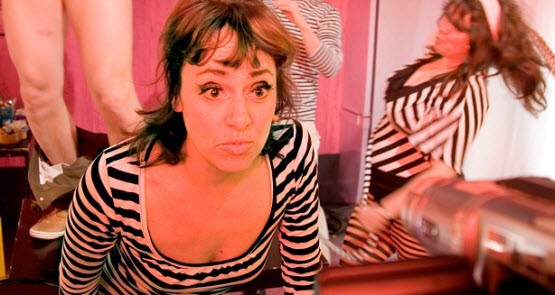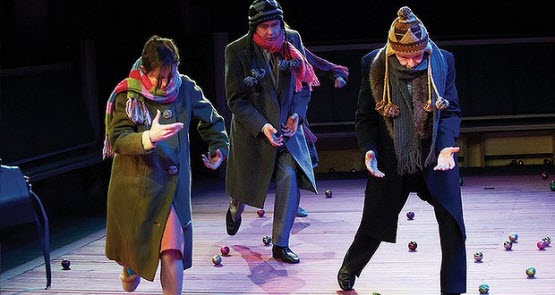
Once again, the Brisbane Powerhouse has proved its value to the arts community in Brisbane and to world theatre generally.
Over 11 days in February, audiences were variously entertained, shocked, amused, deeply moved and astounded by more than 30 theatre experiences encompassing everything from mainstream (but never mainline) plays to film, music and conversations. Most of them lasted about an hour, and everything I saw showed how the most dangerous live theatre can step out of line and push the boundaries without losing anything in the reinvention.
I managed to get to six plays; one of them, Parah from Malaysia, I’ve reviewed previously. The others I saw came from Germany (Gob Squad’s Kitchen), Belgium (The Last Supper), Ireland’s Pan Pan Theatre (A Doll House), Iran (White Rabbit Red Rabbit) and another Irish company called Hotfortheatre (I (heart) Alice (heart) I).
People came out gobsmacked, in my case especially by White Rabbit Red Rabbit. If you choose to see it as absurdist drama, it is intensely entertaining, unique in its construction — no director, no rehearsal and a different actor every night reading from a script they have never seen before. The voice is that of a young Iranian man forbidden to leave his country for political reasons. He wrote this script about 10 years ago, and therefore addresses an unknown audience.
Yes, any playwright does this, but Nassim Soleimanpour enriches his statement by implicating members of the audience, as well as the narrator, in a fairytale about rabbits, cultural oppression and deep metaphysical questions. We are drawn from farce into brain-taxing reality, and it was one of the most morally unsettling pieces of theatre I’ve ever seen. The fact the author, who has only recently been given a passport, was also in the audience, added to the mystery — by the end of the play we don’t know what’s real and what’s not, so when he came up on stage we didn’t know what to think.
None of the plays let the audience off easily. The Last Supper, where about 40 people sat at a huge dinner table that took up the whole of the Turbine Platform, was about famous last words, and eating them — on rice paper, luckily, because there was a whole lot of gobbling going on. The dinner guests/audience were given numbers, some of which related to prisoners on death row and their requests for a last meal, and when the numbers and names of the real prisoners were read out and the actual meal brought out to the audience member, what began as a clever idea developed into an unnerving reality. Once the laughing admiration died down, we were left in the troubled dark, with much to meditate on as we went home.
I (heart) Alice (heart) I, an Irish production, was a two-hander played straight to the audience, with two dowdy women in late middle age confessing shyly and awkwardly their lesbian love affair. Such an unusual couple evoked warmth and sympathy from the audience, and I have never seen characters on stage who seemed so real, as if they weren’t actors, but actual people plucked from obscurity to tell their story. No great drama, no huge denouement, and ending with a whimper rather than a bang. All we could feel for them was love and pity, so when the end of the play came and they whipped off their wigs to reveal themselves as feisty young women in their twenties, the shock factor was devastating.
Gob Squad’s Kitchen, which recreated Andy Warhol’s own kitchen complete with “bad coffee, nervous breakdowns and wild parties”, brought back the world of the 1960s and made those of us who lived through it and survived wonder what it had all been about, and why. What happens? Nothing. How does it happen? In the hedonistic world of the swinging ’60s where people hang around and do nothing, seemingly as befuddled as the audience, who could only sit back and wonder.
And finally to Pan Pan Theatre from Ireland and their retake on Ibsen’s classic in A Doll House. Here Nora is portrayed as a real doll, and the characters who manipulate her are as unreal as she is. A clever idea, but not entirely convincing as, in spite of the undoubtedly clever re-interpretation, the actors were as wooden as the dolls they portrayed, and left me, at least, as unsatisfied as I was unsettled. It doesn’t really come to grips with Nora’s dilemma, and lets the comedy degenerate into farce while leaving the tragedy unexplored. And any play that needs four pages of post-modern justification of its meaning is automatically suspect, I feel, especially as it didn’t work.
But overall the World Theatre Festival was another triumph for the Brisbane Powerhouse. Short and sharp, but with very little publicity outside south-east Queensland, it keeps doing what the Powerhouse does best, bringing some of the most creative new world theatre to appreciative audiences of all ages — and that’s something that mainstage companies find it hard to do.
So put next year’s dates in your diary — it will be in February, and it’s worth making a special trip to Brisbane.








Crikey is committed to hosting lively discussions. Help us keep the conversation useful, interesting and welcoming. We aim to publish comments quickly in the interest of promoting robust conversation, but we’re a small team and we deploy filters to protect against legal risk. Occasionally your comment may be held up while we review, but we’re working as fast as we can to keep the conversation rolling.
The Crikey comment section is members-only content. Please subscribe to leave a comment.
The Crikey comment section is members-only content. Please login to leave a comment.